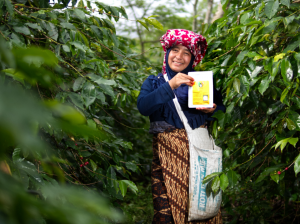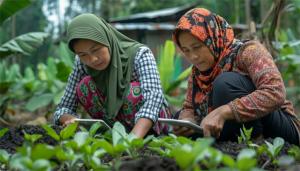From Gender Equity to Carbon Tracking: KOLTIVA, with Unilever, FCDO, and EY, Helps Sugata Transform Cocoa Supply Chain
KOLTIVA and Sugata, supported by Unilever, FCDO, and EY, drive regenerative cocoa farming through gender equity and carbon tracking
ZURICH, SWITZERLAND, November 12, 2025 /EINPresswire.com/ -- Indonesia’s cocoa industry plays a pivotal role in both local economies and global markets. Yet, declining productivity, aging trees, and the growing impacts of climate change continue to challenge its long-term sustainability. To address these issues, Sugata (PT Kudeungoe Sugata), a purpose-driven cocoa enterprise focused on sustainable livelihoods and environmental restoration, is leading efforts to advance regenerative cocoa production with the support of KOLTIVA and global partners, including Unilever, the UK Foreign, Commonwealth & Development Office (FCDO), and EY through the TRANSFORM Bestari Challenge.The initiative accelerates innovation for smallholder farmers by integrating digital traceability, climate-smart agriculture training, and inclusive financing models. By combining Sugata’s community-based approach with KOLTIVA’s proven technology ecosystem—including KoltiTrace for farm-to-bar traceability and KoltiSkills for training delivery—the collaboration aims to build a more resilient cocoa value chain that drives income diversification and supports forest conservation.
Founded in 2018, Sugata has built a reputation as one of Indonesia’s first bean-to-bar enterprises sourcing directly from smallholders. Its mission to regenerate degraded lands and restore livelihoods has positioned the company as a frontrunner in sustainable cocoa innovation.
Nestled within Aceh’s eastern flank of the 2.6 million-ha Leuser Ecosystem, one of the world’s last intact tropical rainforests and the only place where Sumatran tigers, elephants, rhinos, and orangutans still cohabit, the province’s sprawling cocoa belt forms a lifeline for local communities. With more than 101,000 ha of cocoa and an annual output of 41,000 tons, Aceh ranks as Indonesia’s fourth-largest cocoa producer (Invest in Aceh, 2023). This vast landscape, home to nine rivers, three lakes, and 185,000 ha of peatlands storing 1.6 billion tons of carbon, supplies clean water to four million people—services valued at over US $600 million a year. Yet aging trees, pests, erratic weather, and ongoing deforestation as monocultures replace rainforest cover threaten both livelihoods and the watershed, which has already lost 20 percent of its lowland forests in the past five years (Global Conservation, 2023).
In response, global policy drivers such as the EU Deforestation Regulation (EUDR), the UN Sustainable Development Goals (SDGs), and corporate zero-deforestation pledges are steering cocoa into a new era. Regenerative cocoa, planted under a biodiverse canopy and managed through agroforestry, nutrient recycling, and digital traceability, represents not just a conservation strategy but a pathway to long-term profitability and compliance.
In 2024, the TRANSFORM: BESTARI Challenge, co-led by Unilever, FCDO, and EY, invited Indonesian enterprises to pilot solutions advancing the SDGs, offering grants of up to £300,000. This unique accelerator, blends funding with tailored business support to tackle complex development challenges. As a result, in October 2024, Sugata, was named one of three winners, securing funding to pilot regenerative cocoa in Southeast Aceh. The 18-month project brings together Sugata, KOLTIVA, Unilever, FCDO, and EY to make regenerative cocoa measurable, scalable, and commercially viable.
AI-generated content may be incorrect.To catalyze the initiative, Sugata engaged KOLTIVA as its implementation partner, bringing in expertise to deliver digital traceability, farm-level training, and live data-driven decision-making. Through five integrated workstreams, including Gender Action Learning System (GALS), Demo Plot Management, Regenerative Agriculture and Agroforestry, Cocoa Waste Management, and GHG Monitoring. The collaboration embeds sustainability into every pod, plot, and producer’s decision. Together, these initiatives demonstrate how regenerative cocoa production can balance productivity, profitability, and environmental stewardship.
KOLTIVA’s Executive Chairman of the Board, Joe Keen Poon says, “What we’re building together with Sugata, Unilever, and FCDO in Aceh is more than a project, it’s a blueprint for the future of responsible cocoa. At KOLTIVA, we believe that smallholders deserve more than compliance requirements; they deserve technology, training, and fair opportunities to thrive in global markets. By connecting real-time farm data, gender-inclusive decision-making, and carbon tracking in one system, we’re showing that regeneration and profitability are not opposing goals, they are the only way forward.”
Since late 2024, Sugata and KOLTIVA have co-developed training curricula, secured demonstration sites, and trained master trainers to accelerate field implementation. Within the first year, more than 500 cocoa producers in 21 villages have received training through KoltiSkills, 10 regenerative demo plots have been established with live emissions tracking, and five biochar units are converting cocoa waste into compost to reduce chemical fertilizer dependency. Additionally, 173 plots have been surveyed for GHG baselines, while over 100 households have adopted gender-inclusive decision-making models through GALS.
“Sugata demonstrates strong commitment to advancing positive social and environmental change in the agricultural sector,” said Jessica Pauline, Country Lead Finance & Business Development, Unilever Indonesia. “Impact enterprises like Sugata are essential to solving global sustainability challenges. Beyond grant funding, TRANSFORM leverages cross-sector collaboration to help enterprises like Sugata scale their impact.”
While challenges such as erratic weather and varying digital literacy persist, the initiative is already demonstrating how technology, data, and inclusive participation can reshape the future of cocoa farming—delivering measurable environmental gains, diversified incomes, and greater resilience for smallholder communities.
Daniel Prasetyo
KOLTIVA
+ +62 811-1671-919
public.relations@koltiva.com
Visit us on social media:
LinkedIn
Instagram
YouTube
Legal Disclaimer:
EIN Presswire provides this news content "as is" without warranty of any kind. We do not accept any responsibility or liability for the accuracy, content, images, videos, licenses, completeness, legality, or reliability of the information contained in this article. If you have any complaints or copyright issues related to this article, kindly contact the author above.


